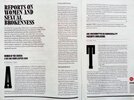If this passes, the PCA, and very quickly, will go the way of the old PCUS. Not exactly the same, but in generalities, exactly the same (toss subscription, advance egalitarianism, evolution, etc.). The progressives killed any hope of a confessional church in 2002 when good faith subscription was rammed through, theistic evolution is taught without consequence, and we have in practice, women deacons already and with impunity. Just have them in a way the skirts the letter of the law. This may fail this year; but history tells us progressives are untiring, and conservatives give up and when their numbers dwindle the pace quickens. I read/showed this to two TEs, one former and one still PCA, and one while generally pretty down on the PCA was still shocked by this and the other said "this is sick."
I got this from Andrew Barnes on Facebook who explains,
"This comes from the Cooperative Ministries Committee (which is made up of the last 5 moderators of GA, and heads of all the Permanent Committees/Agencies). However, CMC can't recommend anything to the GA by themselves, they have to go through a Permanent Committee/Agency (one that is appropriate to the action they are recommending). So this is the CMC through AC to GA."
For back ground here is the report of this committee of past moderators, and other men and women:

Now maybe this is watered down or killed but the fact that it is proposed, by a committee that included 5 past moderators no less, indicates this is not going away. It will keep coming up. When they get tired of dealing with the confessionalists or conservatives they will force it through like they did good faith subscription. And after all, it is more important to them to retain millennials who own the surrounding degraded culture than retain those defending Presbyterian doctrine and practice.
I got this from Andrew Barnes on Facebook who explains,
"This comes from the Cooperative Ministries Committee (which is made up of the last 5 moderators of GA, and heads of all the Permanent Committees/Agencies). However, CMC can't recommend anything to the GA by themselves, they have to go through a Permanent Committee/Agency (one that is appropriate to the action they are recommending). So this is the CMC through AC to GA."
3. That Assembly form a study committee on the issue of women serving in the ministry of the church (RAO 9-1; 9-3). The Assembly authorizes the Moderator to appoint the study committee. The study committee should be made up of competent men and women representing the diversity of opinions within the PCA (RAO 9-1; Robert’s Rules of Order [11[SUP]th[/SUP] edition], 14, pp. 174-175, 50, pp. 495-496; 50, pp. 497-498 56, p. 579]).
The committee should give particular attention to the issues of:
The committee should give particular attention to the issues of:
- The biblical basis, theology, history, nature and authority of ordination;
- (2) The biblical nature and function of the office of deacon;
- (3) Clarification on the ordination or commissioning of deacons/deaconesses;
- (4) Should the findings of the study committee warrant BCO changes, the study committee will propose such changes for the General Assembly to consider.
The committee will have a budget of $15,000 that is funded by designated donations to the AC from churches and individuals (RAO 9-2).
A Pastoral Letter to be proposed by the ad interim study committee and approved by the General Assembly be sent to all churches, encouraging them to (1) promote he practice of women in ministry, (2) appoint women to serve alongside elders and deacons in the pastoral work of the church, and (3) hire women on church staff in appropriate ministries.
Grounds: The Cooperative Ministries Committee may not make recommendations directly to the General Assembly but must do so through an apropriate committee or agency (RAO 7-3 c; 7-6). The CMC has had a subcommittee on the role of women and has sent several recommendations to the AC (including a proposal for a study committee on the issue women serving in the church) and CDM to bring to the Assembly.
A Pastoral Letter to be proposed by the ad interim study committee and approved by the General Assembly be sent to all churches, encouraging them to (1) promote he practice of women in ministry, (2) appoint women to serve alongside elders and deacons in the pastoral work of the church, and (3) hire women on church staff in appropriate ministries.
Grounds: The Cooperative Ministries Committee may not make recommendations directly to the General Assembly but must do so through an apropriate committee or agency (RAO 7-3 c; 7-6). The CMC has had a subcommittee on the role of women and has sent several recommendations to the AC (including a proposal for a study committee on the issue women serving in the church) and CDM to bring to the Assembly.
For back ground here is the report of this committee of past moderators, and other men and women:

Now maybe this is watered down or killed but the fact that it is proposed, by a committee that included 5 past moderators no less, indicates this is not going away. It will keep coming up. When they get tired of dealing with the confessionalists or conservatives they will force it through like they did good faith subscription. And after all, it is more important to them to retain millennials who own the surrounding degraded culture than retain those defending Presbyterian doctrine and practice.

